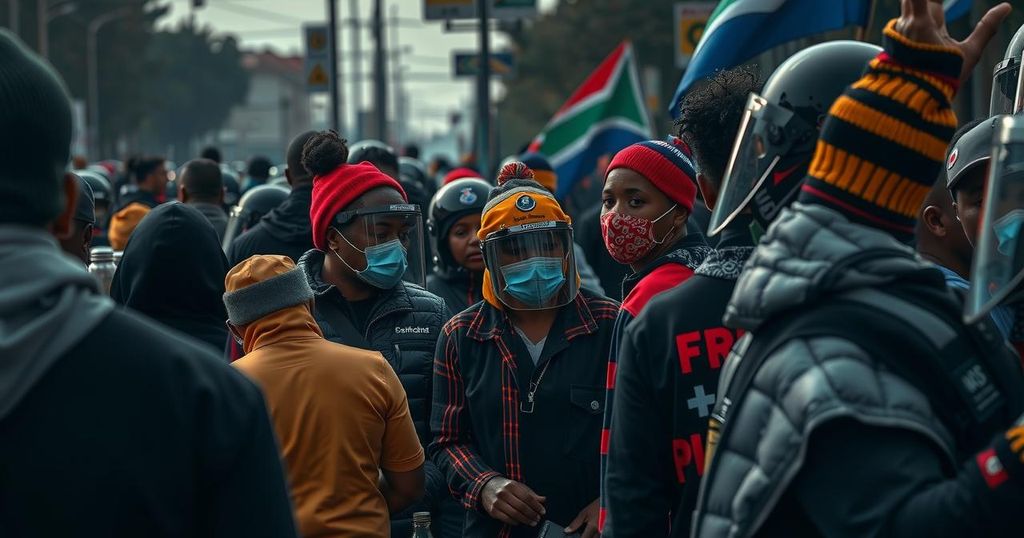Crime
ACCIDENTS, AFP, AFRICA, ASIA, CRIME, CUBA, DU, ETHIOPIA, INDIA, JAMAICA, JAMAICA OBSERVER, JAPAN, JOHANNESBURG, JUSTICE, KIDNAPPING, MAP, MAPHOKA MOHALANWANI, MO, NALEDI, NORTH AMERICA, OLIEVENHOUTBOSCH, PAKISTAN, PRETORIA, SARAH MABOTSA, SO, SOUTH AFRICA, SOWETO, VIOLENCE
Fatima Alavi
0 Comments
Child Poisoning Deaths Fuel Xenophobia in South Africa
A recent wave of child fatalities from suspected food poisoning in Johannesburg has incited outrage and xenophobia against foreign shop owners in South Africa. The tragic deaths have resulted in violent reactions, compliance checks, and calls for the expulsion of foreign nationals from spaza shops. Operation Dudula, a vigilante group, has taken steps to replace foreign shopkeepers with locals amid allegations of health violations and a rising perception of competition for business. The situation underscores the tensions between economic needs and xenophobic sentiments as communities grapple with the implications of these deaths.
In recent months, South Africa has witnessed a distressing surge in child fatalities attributed to suspected food poisoning, claiming the lives of 23 children in Johannesburg alone. This alarming trend has exacerbated existing tensions towards foreign nationals, particularly Ethiopian shopkeepers in spaza shops. Following a tragic incident where six children from Soweto succumbed to poisoning purportedly linked to a spaza, community outrage prompted violent action against the establishment, leading to attacks and calls for the expulsion of foreign shop operators. Investigations revealed the presence of pesticides in the children’s autopsy results; however, no conclusive evidence has definitively connected these deaths to the spaza shops. In response to public outcry, authorities commenced compliance checks on foreign-owned spazas, resulting in their closures for regulatory violations such as selling expired food. Interestingly, this unrest coincides with the rise of vigilante groups like Operation Dudula, striving to replace foreign shopkeepers with South Africans and suggesting underlying competition for business as a motive. The association between these incidents and xenophobia has become palpable, with some citizens alleging intentional acts by foreigners to harm South Africans. The situation is complicated further by differing perspectives on the veracity of the poisoning claims and the motivations behind the subsequent violence against spaza shops. Despite the risks posed to foreign nationals, local residents express reliance on these establishments for daily necessities, reflecting the complexity of this socio-economic dilemma.
This article addresses the rising incidents of child deaths in South Africa attributed to food poisoning and the ensuing xenophobic sentiment directed towards foreign nationals operating small corner shops, commonly referred to as spazas. Such shops play a significant role in local economies but have sparked tension amidst South Africa’s severe economic challenges, including high unemployment rates. The intersection of health concerns and nationalistic sentiments has led to public violence and increased scrutiny of foreign-owned businesses, prompting discussions around immigration and local economic competition. Xenophobic groups have taken aggressive stances, claiming that replacing foreign shopkeepers is necessary to ensure community safety and compliance with local laws, while experts emphasize that such actions may primarily aim to eliminate business competition rather than genuinely address public health concerns.
The spate of child poisoning incidents in South Africa has intensified existing xenophobic sentiments towards foreign nationals operating spaza shops, resulting in violent community actions and governmental scrutiny. The tragic deaths of young children have stirred public outrage, culminating in vigilante efforts to replace these shopkeepers with South Africans. This complex scenario reflects broader socio-economic challenges, including competition in the employment market and the intersection between community health issues and national identity, warranting careful examination from policymakers and community leaders.
Original Source: www.jamaicaobserver.com




Post Comment